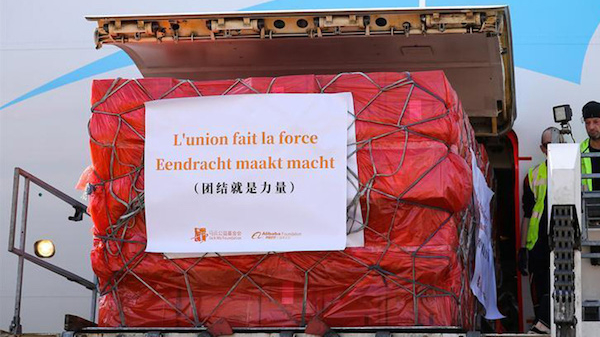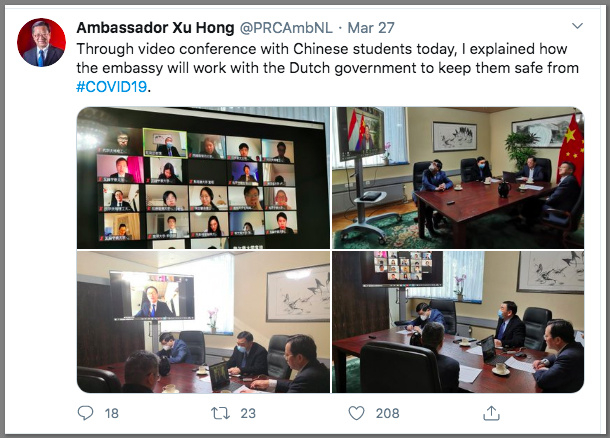
Medical equipment with a banner saying "Unity is power" written in French, Dutch and Chinese arrives at Liege Airport, Belgium, March 16, 2020. /Xinhua
Medical equipment with a banner saying "Unity is power" written in French, Dutch and Chinese arrives at Liege Airport, Belgium, March 16, 2020. /Xinhua
Editor's Note: Hannan Hussain is a security analyst at the London School of Economics - South Asia Center and an author. He is also an international affairs commentator for The Diplomat, a leading foreign policy magazine based in Washington. The article reflects the author's opinions, and not necessarily the views of CGTN.
On March 28, 2020, the government of the Netherlands voiced its reservation on 600,000 face masks that were produced in China, after suspicion that the masks did not meet quality standards. "A second test also revealed that the masks did not meet the quality norms. Now it has been decided not to use any of this shipment," said its health ministry.
China, which takes its commitments to pandemic assistance very seriously, engaged its ambassador to the Netherlands Mr. Xu Hong with utmost immediacy. "I spoke with Dutch Minister for Medical Care and Sport Martin van Rijn on the telephone," remarked Xu. "The Netherlands is still looking into the situation, and if there is any further information, it will inform the Chinese side in the first time."
As emphasized by Beijing, it is extremely important to remember that both countries are actively engaged in investigating the matter, and that during this period, any premature conclusion would be far from factual.
Both nations share a healthy partnership during the course of the pandemic, with Dutch Prime Minister Mark Rutte expressing his firm belief in China's coordination and control efforts with the World Health Organization last month.
It is also fair to point out that Beijing's shipment of some 1.3 million FFP2 masks to the Netherlands last week, was the result of "direct bilateral coordination" – the exact arrangement best suited to overcoming the incident. However, certain media reports have tried to politicize the issue, without due emphasis on context.
Recent coverage run by The Financial Times, provocatively titled "Countries reject China pandemic product batches," attempted to portray the ongoing investigation as part of some aggressive Chinese campaign to undermine the COVID-19 fight in Europe.
What the report conveniently dismisses is the fact that Chinese authorities are actively engaged with over 80 countries worldwide, and there is a unanimous consensus on globally accepted health standards governing the shipments.
Moreover, the clusters of masks sent to the Netherlands came with a KN95 certification, which ensures that 95 percent of all airborne particles are actively filtered out.
Both The Hague and Beijing recognize that it is absolutely normal for such reservations to surface during wide-ranging, time-sensitive COVID-19 cooperation. "It is normal if some problems arise during the cooperation. These problems can be solved in an objective manner, but should not be politicized," said Xu to reporters in the Dutch capital.

Screenshot of Chinese Ambassador to the Netherlands Xu Hong's Twitter says the Chinese and Dutch governments are working together to keep Chinese students safe from COVID-19.
Screenshot of Chinese Ambassador to the Netherlands Xu Hong's Twitter says the Chinese and Dutch governments are working together to keep Chinese students safe from COVID-19.
This overwhelming sense of objectivity is also shared by Dutch government officials, who consider the matter an "isolated incident" that will not affect friendly cooperation between the two countries during the COVID-19 pandemic.
Much of these factual takeaways are absent from the Western discourse. Instead, the goal is to malign the scale and rapidity of China's emergency response to key allies in Europe.
Ambassador Xu also conveyed to the public what matters most in a situation as sensitive as the COVID-19 pandemic – to avoid politicizing the matter under investigation. "We are trying to save more lives. There is no 'geopolitical consideration' as few claimed."
There are several reasons why geopolitics does not apply to a situation such as this.
First, the Netherlands never once construed the recalled masks as a matter of political intent by Beijing, as some U.S. publications have erroneously argued.
"The Netherlands has become the latest European country to dump what it says is substandard Chinese-made equipment in the fight against coronavirus," wrote Tim Hume of VICE News, becoming the self-appointed spokesperson for the Dutch government.
In truth, the investigation has not concluded, and the matter was relayed by the government of the Netherlands to Chinese authorities, as they scrutinize the shipments with utmost responsibility.
Similar reports have also denied emphasis on China's industrial capacity to generate the medical equipment in the first place. A global shortage of crucial health supplies was the primary driver of China's rapid production, and its ability to overcome any potential defaults remains undisputed.
In fact, Ambassador Xu made it categorically clear that China looks forward "to the results of further investigations by the Dutch side on the quality of the masks, and we hope the Dutch side could provide the Chinese side with more detailed information."
There is ample evidence from other European capitals, including Madrid – that has been a popular reference point in the West's smearing campaign of Chinese global assistance.
Companies based in Beijing (upon reception of accurate investigation results) have stepped in to assure that "the sensitivity and specificity needed to help Spain fight against COVID-19" remains intact.
Out of the wide majority of 80-plus nations that China is currently assisting, most have reported no incidents of defections and complete satisfaction with Sino-European cooperation is well known.
Hence, as the matter of defective masks subjects itself to an intergovernmental investigation, media outlets and foreign powers must not prematurely conclude the outcome, especially when the COVID-19 pandemic is being recognized as a mutual challenge.
If there is one country amply equipped to accelerate supplies, quality and assistance based on credible findings, it is China.
(If you want to contribute and have specific expertise, please contact us at opinions@cgtn.com.)